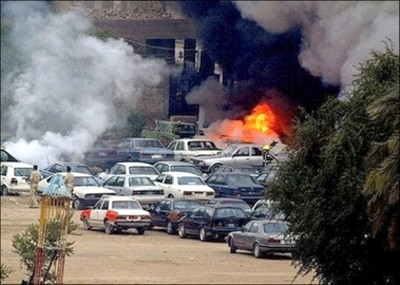Bush meets with Iraq panel; Democrats call for beginning of phased withdrawal

Fire rises from the site of a bomb that exploded inside a parking lot in central Baghdad today
WASHINGTON (Reuters) - President George W. Bush cautioned Democrats wanting to reduce the U.S. troop presence in Iraq to consider conditions on the ground as he met on Monday with a bipartisan group expected to offer a plan for changing course in Iraq.
Under pressure from Democrats to shift strategy in Iraq, Bush sat down with members of the independent Iraq Study Group, which is led by former Secretary of State James Baker, a Republican with close ties to the Bush family, and former Democratic Rep. Lee Hamilton of Indiana.
The independent panel is writing a report for handing to Bush and the U.S. Congress next month that experts believe may offer the president a way for a change of tactics in Iraq.
"I'm not sure what the report is going to say," Bush told reporters after meeting the group for more than the allotted hour and 15 minutes. "I'm looking forward to seeing it."
The group's work has attracted great interest from both parties after the opposition Democrats' sweeping victory last week that gave them control of the House of Representatives and the Senate.
Injecting a note of caution into the possibility of a major shift in strategy, Bush said: "I believe that it's important for us to succeed in Iraq, not only for our security but for the security of the Middle East, and that I'm looking forward to interesting ideas."
Democrats are already vowing to use their newfound majority power to press for U.S. troop reductions in Iraq in a matter of months, an option Bush adamantly opposed during the just-ended congressional campaign season.
"We've got to put greater responsibility on the Iraqis and that the way to do that -- probably the only way to do that -- is to let the Iraqis know that within four to six months of the president notifying them, that we're going to begin a phased redeployment of our troops out of Iraq," Michigan Democratic Sen. Carl Levin said.
Asked about the Democratic move, Bush said he believed it was important "for people making suggestions to recognize that the best military options depend upon the conditions on the ground."
White House spokesman Tony Snow offered few details of the talks with the Iraq Study Group except to say the commission was not yet presenting its alternatives to the president.
"That would be inappropriate. The one thing that the commission has been very clear about is its independence, and we've also been respecting that independence. So, no, there is not going to be the presentation of alternatives," he said.
Commission members also planned to sit down with Gen. George Casey, commander of U.S. forces in Iraq, CIA Director Michael Hayden, national intelligence director John Negroponte, Secretary of State Condoleezza Rice, Defense Secretary Donald Rumsfeld, and Zalmay Khalilzad, U.S. ambassador to Iraq.
On Tuesday, the commission is to meet Democratic leaders and will have a video conference with British Prime Minister Tony Blair.
Read the rest at the Washington Post

<< Home